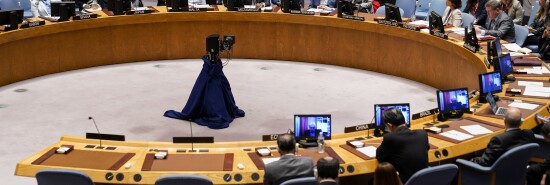
What’s behind the State Department’s South Africa controversy?
Daniel DePetris
Video Embed
One of the first jobs of a diplomat is not to make a situation worse. Sometimes picking fights is appropriate, and sometimes it can lead to unnecessary drama.
The latter is what seems to be happening with U.S. diplomats in South Africa. Last week, U.S. Ambassador Reuben Brigety alleged that the South African government delivered weapons to a U.S.-sanctioned Russian cargo vessel that docked in Simon’s Town naval base last December. The career U.S. diplomat, who was once the top U.S. representative to the African Union, told South African media that the United States was “confident that weapons were loaded onto that vessel, and I would bet my life on the accuracy on that assertion.” The statement, if true, would be a bombshell: Africa’s most developed country, considered a regional heavyweight, was purposely arming Russia, an aggressor country, despite its claims of neutrality on the war in Ukraine.
RUSSIA AND UKRAINE PROGRESSING ON GRAIN DEAL EXTENSION, TURKEY SAYS
The South Africans, of course, didn’t take too kindly to Brigety’s comments. The ambassador was summoned to the South African foreign ministry, where he was given the diplomatic dressing down. South African President Cyril Ramaphosa has said a retired judge is investigating the claims, but his subordinates are nevertheless peeved about the dispute hitting the airwaves. South Africa’s Department of International Relations and Cooperation said the ambassador’s remarks were “puzzling and at odds with the mutually beneficial and cordial relationship that exists between the United States of America and South Africa.”
It’s not like Brigety was going off the reservation. The story of a Russian vessel docking on the South African coast was disclosed in the Wall Street Journal about a month after it happened, and U.S. officials registered their concerns at the time that something nefarious may have gone on. Even so, there is something a bit odd about this episode. Brigety sounded almost apologetic after he held his meeting at the South African foreign ministry, tweeting that he was “grateful for the opportunity” to fix “any misimpression” from his remarks days earlier. The South Africans stated that he issued an apology — an apology for what, exactly, we don’t know. Secretary of State Antony Blinken had a call with South African Foreign Minister Naledi Pandor as well, presumably to aid the cleanup effort. Again, what he was cleaning up was a mystery.
One suspects, however, that the apologies and acts of contrition have something to do with the fact that America’s man in Pretoria aired dirty laundry in such a public fashion. It’s one thing to express concern at a State Department briefing — it’s another thing entirely for an ambassador to speak to local journalists and all but accuse his hosts of a covert scheme to arm Russia’s war effort. Putting those allegations into the public domain is an explosive move, especially if your public case doesn’t include any evidence other than “trust us.”
Making matters worse, U.S.-South Africa relations are already a bit testy these days. The U.S. doesn’t appreciate the fact that South Africa has abstained from U.N. resolutions condemning Russia for its invasion, allowed Russian and Chinese warships to use its waters for military exercises in February, and continues to argue for an immediate ceasefire in Ukraine. At the State Department, there is probably lingering frustration that Pretoria isn’t outsourcing its Ukraine and Russia policy to Washington.
But it’s exactly when bilateral relations are tense that leaders on both sides need to be careful with their words. The Biden administration’s slight rollback suggests they arrived at this conclusion a little too late.
CLICK HERE TO READ MORE FROM THE WASHINGTON EXAMINER
Daniel DePetris (@DanDePetris) is a contributor to the Washington Examiner’s Beltway Confidential blog. His opinions are his own.
